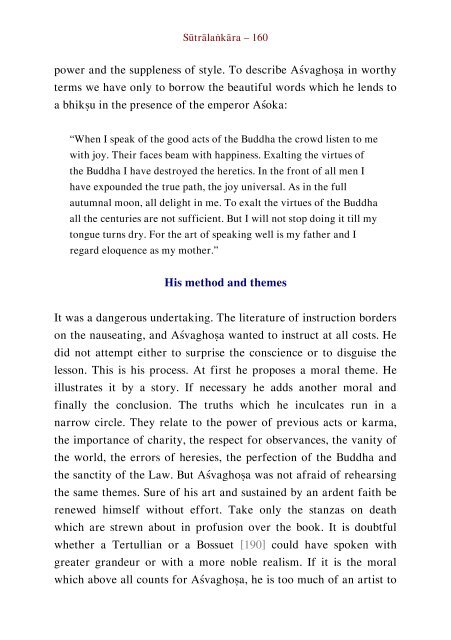Literary History of Sanskrit Buddhism
A study by J. K. Nariman of Sanskrit Buddhism from the Early Buddhist Tradition up to the Mahayana texts proper.
A study by J. K. Nariman of Sanskrit Buddhism from the Early Buddhist Tradition up to the Mahayana texts proper.
You also want an ePaper? Increase the reach of your titles
YUMPU automatically turns print PDFs into web optimized ePapers that Google loves.
Sūtrālaṅkāra – 160<br />
power and the suppleness <strong>of</strong> style. To describe Aśvaghoṣa in worthy<br />
terms we have only to borrow the beautiful words which he lends to<br />
a bhikṣu in the presence <strong>of</strong> the emperor Aśoka:<br />
“When I speak <strong>of</strong> the good acts <strong>of</strong> the Buddha the crowd listen to me<br />
with joy. Their faces beam with happiness. Exalting the virtues <strong>of</strong><br />
the Buddha I have destroyed the heretics. In the front <strong>of</strong> all men I<br />
have expounded the true path, the joy universal. As in the full<br />
autumnal moon, all delight in me. To exalt the virtues <strong>of</strong> the Buddha<br />
all the centuries are not sufficient. But I will not stop doing it till my<br />
tongue turns dry. For the art <strong>of</strong> speaking well is my father and I<br />
regard eloquence as my mother.”<br />
His method and themes<br />
It was a dangerous undertaking. The literature <strong>of</strong> instruction borders<br />
on the nauseating, and Aśvaghoṣa wanted to instruct at all costs. He<br />
did not attempt either to surprise the conscience or to disguise the<br />
lesson. This is his process. At first he proposes a moral theme. He<br />
illustrates it by a story. If necessary he adds another moral and<br />
finally the conclusion. The truths which he inculcates run in a<br />
narrow circle. They relate to the power <strong>of</strong> previous acts or karma,<br />
the importance <strong>of</strong> charity, the respect for observances, the vanity <strong>of</strong><br />
the world, the errors <strong>of</strong> heresies, the perfection <strong>of</strong> the Buddha and<br />
the sanctity <strong>of</strong> the Law. But Aśvaghoṣa was not afraid <strong>of</strong> rehearsing<br />
the same themes. Sure <strong>of</strong> his art and sustained by an ardent faith be<br />
renewed himself without effort. Take only the stanzas on death<br />
which are strewn about in pr<strong>of</strong>usion over the book. It is doubtful<br />
whether a Tertullian or a Bossuet [190] could have spoken with<br />
greater grandeur or with a more noble realism. If it is the moral<br />
which above all counts for Aśvaghoṣa, he is too much <strong>of</strong> an artist to


















